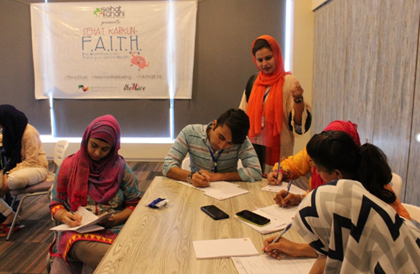Promoting good mental health in South Asia

Our Mental Health Manager in Pakistan took some time to reflect and shed light on the current mental health crisis in South Asia and the vital work the British Asian Trust is doing to combat this issue.
Having recently moved to Pakistan, and being a mental health professional, I have been shocked and astonished by how the issue of mental health is dealt with in the country: shocked by the lack of basic medical facilities available to low-income families experiencing mental health issues and pleasantly surprised by the wonderful organisations that are coming together to fill this void.
Mental health care is both critically under-resourced and a neglected public health topic in South Asia. At a time when mental health issues are estimated to affect one in four of the population, the need for treatment and open discussion is grossly underestimated. Ignoring mental health issues not only harms individuals but also has negative socio-economic effects for the country. With the current population of the country, there are an estimated 50 million people who will suffer from treatable mental health issues in Pakistan at some point in their lifetime. However, there are less than 400 licensed psychiatrists and only 500 registered clinical psychologists in the country, and a very limited primary healthcare system in place, which leads to thousands, if not millions, going undiagnosed.
The British Asian Trust has developed a mental health programme with partners CareTech Foundation and COSARAF Charitable Foundation, with the aim of bridging this gap; of improving and strengthening primary mental health care and making it more accessible to communities as well as encouraging open discussion which can lead to early diagnosis. The projects work with marginalised, underprivileged communities, and their impact can already be observed. Project workers have built a rapport with community members, helping them to break barriers and discuss mental health issues as well as address the stigma attached to them. By applying this model, community members become involved in both recognising the issue as well as becoming part of the solution. An observation that has overwhelmed me is the understanding and acceptance of mental health issues once discussions are underway.
We are creating a strong network of partners, who will continue to reach out to communities to lead important discussions about mental health and train members to identify basic signs and symptoms of common mental health issues. People who are identified through screening will continue to be encouraged and helped to get the support that they need for a proper diagnosis. Success in this case is not only helping people receive treatment but also opening the doors to candid discussions on mental health issues.
Our mental health programme is chipping away at a number of barriers, including the mindset of attributing all mental health issues to life circumstances, fate or supernatural influences. There also exists an overwhelming perception that people with mental health issues are often violent, must look different, cannot get better and cannot be productive members of society. The Trust’s projects are working to educate communities that people suffering from mental health issues should not be abandoned, socially isolated or considered a burden on family and society.
With the right information and knowledge, communities are accepting that awareness, prevention and early intervention are key to tackling this solvable problem.
And the British Asian Trust’s project seems to be working. As I was leaving one of the ‘Muhala' meetings (Awareness raising campaign) organised in a street of North Nazimabad, one of the participants from the community, who had up until then been a quiet observer, left me with the following message: “Ilaaj se parhaiz behtar hai” (Prevention is better than treatment) and I could not agree more. Once again, I left astonished.
Sanaa Ahmad, Mental Health Manager (Pakistan), British Asian Trust.
Photo credit: Sehat Kahani
October 2018
